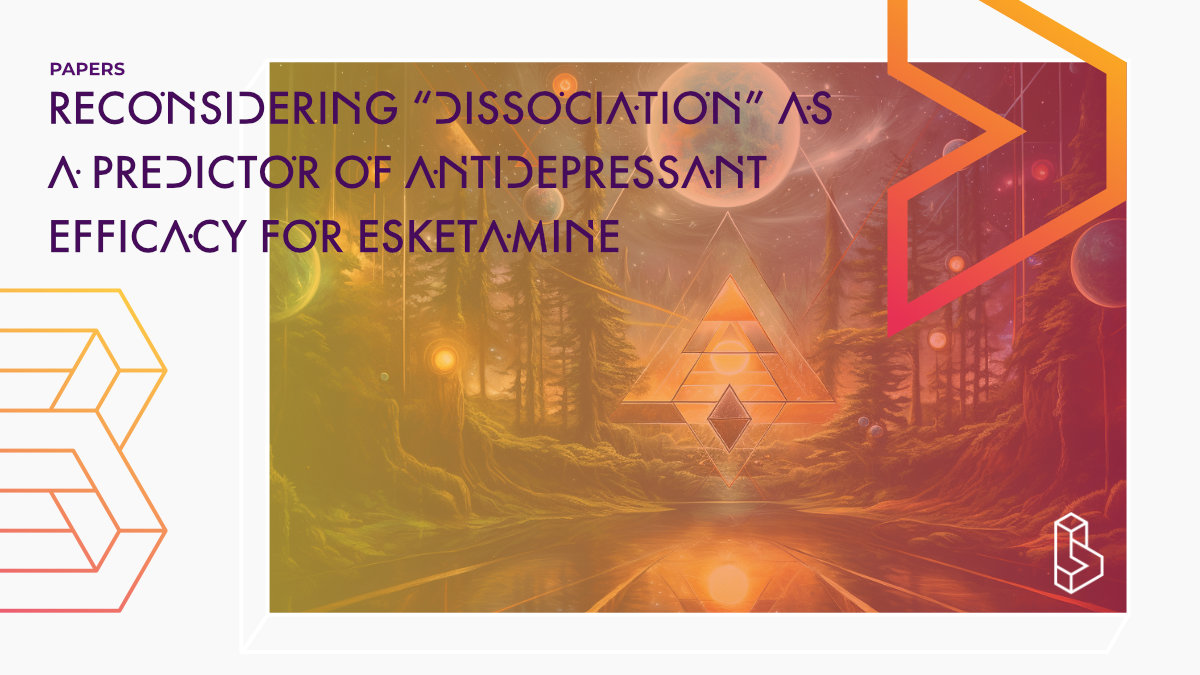This post hoc analysis (n=576) examined the relationship between acute dissociation and the antidepressant efficacy of esketamine in treatment-resistant depression (TRD) by combining data from the TRANSFORM-1 and TRANSFORM-2 clinical trials. It found no clinically significant association between dissociation and antidepressant effect for esketamine, suggesting the need for improved characterization of drug experiences relevant to therapeutic outcomes.
Abstract of Reconsidering “dissociation” as a predictor of antidepressant efficacy for esketamine
“Rationale The relationship between subjective drug experience and antidepressant outcomes for ketamine derivatives is poorly understood but of high clinical relevance. Esketamine is the patented (S)-enantiomer of ketamine and has regulatory approval for psychiatric applications.
Objectives We examined the relationship between acute dissociation, as measured by the Clinician-Administered Dissociative States Scale (CADSS), and antidepressant efficacy, as measured by the Montgomery-Åsberg Depression Rating Scale (MADRS), for esketamine across the 4-week induction phase of treatment.
Methods This post hoc analysis combined data (N = 576) from the TRANSFORM-1 and TRANSFORM-2 clinical trials of esketamine for treatment-resistant depression. Linear mixed models were performed using total MADRS score as the outcome variable with the following independent variables: baseline MADRS score, treatment condition × time interaction, and CADSS × time interaction. To assess whether initial dissociation predicted rapid antidepressant benefit with esketamine, a separately planned regression was performed with day 2 MADRS as the outcome variable with the following dependent variables: baseline MADRS, treatment condition, and day 1 CADSS.
Results The linear mixed model did not show any effect of a CADSS × time interaction (p = 0.7). Looking solely at the effect of day 1 CADSS on day 2 MADRS revealed that each additional CADSS point was associated with a − .04 [95% CI − .08, − .002] (p = .04) decrease in MADRS score.
Conclusions We found no evidence of a clinically significant positive or negative association between dissociation and antidepressant effect for esketamine. Our findings suggest that subsequent inquiry in this area will benefit from improved characterization of drug experiences relevant to therapeutic outcomes.”
Authors: David S. Mathai, Sandeep M. Nayak, David B. Yaden & Albert Garcia-Romeu
Summary of Reconsidering “dissociation” as a predictor of antidepressant efficacy for esketamine
Ketamine was first discovered in 1962 as a phencyclidine (PCP) derivative suitable for human anaesthetic use. Patients experienced a feeling of detachment from their environment, leading to the classification of ketamine as a “dissociative anaesthetic”.
Jacques-Joseph Moreau described dissociation as a breakdown of the unified psychological functioning necessary for health. Pierre Janet proposed that dissociation is a divided state of consciousness precipitated by traumatic or overwhelming experiences that give rise to characteristic forms of psychopathology in at-risk patients.
Find this paper
Reconsidering “dissociation” as a predictor of antidepressant efficacy for esketamine
https://doi.org/10.1007/s00213-023-06324-8
Open Access | Google Scholar | Backup | 🕊
Cite this paper (APA)
Mathai, D. S., Nayak, S. M., Yaden, D. B., & Garcia-Romeu, A. (2023). Reconsidering “dissociation” as a predictor of antidepressant efficacy for esketamine. Psychopharmacology, 240(4), 827-836.
Study details
Compounds studied
Ketamine
Topics studied
Treatment-Resistant Depression
Depression
Study characteristics
Re-analysis
Participants
576
Humans
Authors
Authors associated with this publication with profiles on Blossom
David YadenDavid Bryce Yaden (Ph.D.) is a Research Fellow at Johns Hopkins University School of Medicine. His research focus is on the psychology, neuroscience, and psychopharmacology of psychedelics and other positively transformative experiences. Specifically, David is interested in understanding how brief experiences can result in such long-term changes to well-being.
Albert Garcia-Romeu
Albert Garcia-Romeu is one of the principal researchers in the renaissance of psychedelics studies. He is doing his research at Johns Hopkins and focuses on psilocybin and how it can help with treating addiction.

